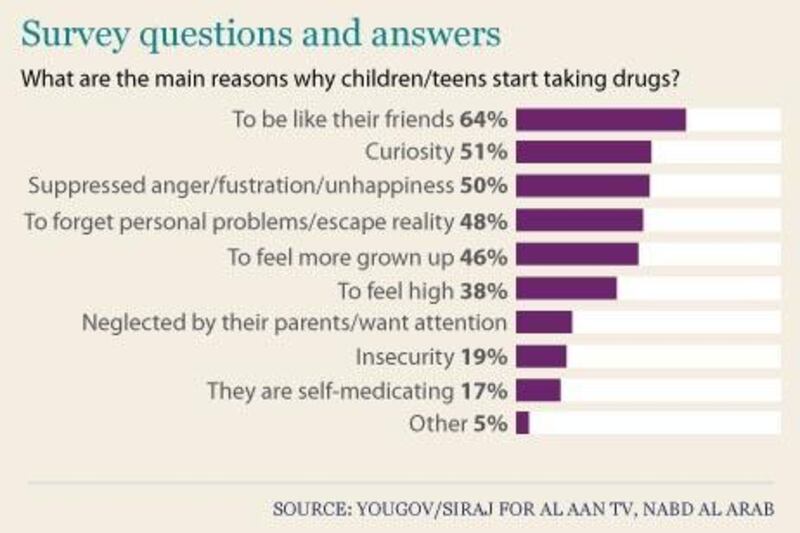A survey has found rising concern in the Emirates about drug abuse among children, leading to calls for the Government to do more to identify and solve the problem.
Almost three quarters of UAE residents surveyed by YouGov Siraj for Al Aan TV said they thought drug consumption among adolescents was increasing, while just one in 10 believed it was not.
Most put the blame squarely on "foreign media". Of the 71 per cent who thought drug use was on the rise, three in five blamed the "effect of foreign media such as movies, TV series and music".
Two thirds also blamed a growing trend of private parties and clubs, where drugs were "commonly consumed", they said.
One in five said it was because drugs were cheap.
Dr Azza Mohamed, a professor of mass communication at UAE University, suggested the media made an easy scapegoat.
"It is only one of the factors," she said. "Others include neglect and problems at home. We can use media to actually stop drug abuse. There is a shortage of drug awareness campaigns."
Of those who said drug use was on the rise, almost three in five said poor family relationships played a role. Of all the UAE respondents, two thirds said the main reason young people started taking drugs was to get the attention of neglectful parents.
When asked what the Government should do, 40 per cent suggested better education for young people. Fewer than one in 10 supported helping addicts reintegrate into society.
Seventeen per cent called for the temptation to be removed altogether by tightening borders and customs control, while 15 per cent wanted harsher punishments.
Mona al Sheraawi, the Abu Dhabi mother of a 13-year-old boy, expressed concern over the findings. "I didn't think it was even an issue here," she said. "My husband does his part at home to educate our son, but it is worrying that he might give in to peer pressure."
The survey's sample from the UAE, 149 respondents, has a margin of error of eight per cent.
Dr Hamdy Moselhy, a psychiatrist who specialises in substance misuse and who runs a clinic at Tawam Hospital in Al Ain, said he believed many teenagers were afraid to seek help because of society's negative views of them.
"Drug use is definitely increasing," he said. "Because of the attitude of the population and most of the Muslim countries, many do not seek help."
People needed to start treating the problem as a medical issue, he said.
Opinions on the harmful effects of drugs were divided. Four in five said drug use led to increased crimes and violence, while fewer than half said it caused an increase in addiction and led to a fall in quality time spent with family and friends.
In stark contrast, three in five said the loss of one's reputation in society was the biggest issue.
Comprehensive statistics on drug use are lacking in the UAE, and region. Without them, the problem is hard to tackle.
Survey respondents blamed the Government for the lack of data, with more than two thirds accusing it of reluctance to engage with negative issues and information.
More than half - 56 per cent - also blamed taboos over drug abuse.
Dr Mohamed, of the UAE University, agreed that although the statistics were scant, drugs were prevalent. "The problem is not publicised, but it is there," she said.
Other countries, such as Iran, have introduced early-age drug education. It operates education programmes in schools, as well as workplaces.
When asked in the UAE survey whether Arab countries should begin drug education in kindergarten, an overwhelming 76 per cent said yes. Just seven per cent said no.
Sultan al Moazin, the head of the Federal National Council's health and social affairs committee and an official at Fujairah Police, said he sided with the majority.
"There needs to be more awareness in schools," he said. "And also, the family plays a big role in this. People need to go back to their religion, which tells them they should stay away from all kinds of addiction."
There is some evidence that early education helps. Simone Donges'Bdiwi, a learning support co-ordinator at Al Nahda International School in Abu Dhabi, has seen several cases of substance abuse in children. One of the main problems was painkillers, she said. "The authorities need to step in and educate kids in schools on the dangers."






